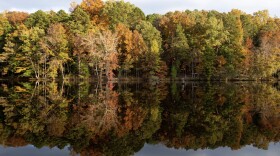-
North Carolina's hazard mapping program is trying to better predict which landslide-prone places face threats in future storms. The state's geological survey responded to more slides after Helene than it had between 1990 and 2023.
-
An injured red-tailed hawk recently appeared near host Peter O'Dowd's neighbor's front yard. The rescue organization that's treating the bird suspects it was electrocuted by a power line.
-
Jacob Soboroff was raised in the Pacific Palisades and reported live from the area as it was devastated by fire in 2025. In Firestorm, Soboroff offers a minute-by-minute account of the catastrophe.
-
The president says his veto of a Colorado infrastructure project is about "fiscal sanity." Some say the president is retaliating against the state for political reasons.
-
Farmers conventionally rely on pesticides to protect their crops. But bats are a more eco-friendly solution.
-
Volunteers in Minnesota are collecting pine needles to help researchers determine how PFAS -- the substances commonly called forever chemicals -- find their way into water, soil and air.
-
Car crashes with wildlife kill about 200 Americans every year.
-
As 2025 winds down, we've been looking at the year's most important stories in areas ranging from politics to art and culture to science.
-
A large stretch of Asheboro forestland home to bobcats and migratory songbirds is now off-limits to development.
-
There's increasing concern about PFAS, the substances commonly called forever chemicals found throughout the environment. Now volunteers in Minnesota are collecting pine needles throughout the state in an effort to help researchers determine how PFAS find their way in water, soil, and air when there seems to be no obvious source
-
First Descents is inviting survivors, caregivers and health care workers to start the new year outdoors at Hanging Rock.
-
Piedmont Land Conservancy Executive Director Kevin Redding shares a few highlights from the nonprofit's 2025 preservation efforts.






